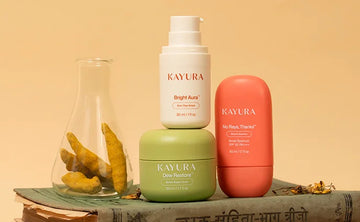You swap sunscreens each season, try every trending serum, and stick to your routine, but some mornings your skin still looks tired, patchy, or congested. Maybe it’s dry winter air, city pollution, or that dull appearance that makes you hesitate before turning on your Zoom camera. You’re doing everything “right,” and yet some days your skin just doesn’t cooperate.
Many assume flawless skin comes from the right products alone, but the truth is more complex. Your skin reflects what you eat, how you sleep, how stressed you feel, and even the thoughts looping in your head. Understanding this connection is the first step toward skin that’s healthy, resilient, and radiant.
Skin Is a Reflection of Lifestyle
Many people think of skin health as separate problems: one cream for dryness, another serum for dark spots. But skin works as a whole system, and every part of your life affects it.
Your skin shows both balance and imbalance. When diet, sleep, stress, or skincare are off, it shows. Breakouts, redness, dryness, puffiness, or a dull, uneven glow are your skin’s signals that something inside or outside isn’t in harmony. But when you care for all of these areas together, your skin becomes stronger and more resilient over time.


What You Put On Your Skin
Topical care is still crucial. It’s the first line of defense and repair. But understanding how each product interacts with your skin’s biology gives you real leverage.
Daily Skincare Routine
A simple, consistent routine matters more than chasing the latest active:
- Cleanse without stripping: Gentle, pH-balanced cleansers maintain the lipid barrier and microbiome. Over-cleansing triggers inflammation and dryness.
- Repair & strengthen: Barrier-first actives like ceramides, peptides, niacinamide, and fatty acids fortify your skin’s defense system. They help skin resist oxidative stress, lock in hydration, and maintain resilience.
- Protect: Broad-spectrum sunscreen (SPF 30+) remains the single most effective anti-aging product. It protects against UV-induced collagen breakdown, pigmentation, and barrier compromise.

Targeted Actives
As skin enters its 30s and beyond, subtle changes like dullness, fine lines, and uneven tone signal the need for targeted, skin-friendly actives:
- Vitamin C brightens pigmentation and provides antioxidant protection.
- Niacinamide strengthens the barrier, evens tone, and calms inflammation.
- Peptides support collagen and elastin, helping maintain firmness and resilience.
- Soothing botanical extracts like turmeric, holy basil, or chamomile calm irritation and support overall skin health.
The key is balance: combining effective actives with tolerance. Overloading your skin with too many potent ingredients can trigger sensitivity, disrupt the barrier, or irritate the microbiome. Choose ingredients that perform without compromising comfort or long-term resilience.
Body Care and Circulation
Holistic skincare extends beyond the face. Practices like:
- Regular body massages with nourishing oils
- Dry brushing to stimulate lymphatic flow
- Occasional herbal baths
support circulation, lymphatic drainage, and overall relaxation, which in turn improves skin tone, texture, and radiance.


Advanced Dermatological Treatments
Procedures like microneedling, chemical peels, and laser resurfacing can accelerate visible results. They stimulate collagen, refine texture, and target pigmentation. But they work best when paired with consistent at-home care, not as stand-alone solutions.
What You Put Inside Your Body
What you eat daily is the first and most important skincare step. The nutrients you provide your body become the building blocks for collagen, elastin, and the resilience your skin needs to look healthy and radiant.
Nutrition as Daily Skincare
- Antioxidants: berries, leafy greens, tomatoes, and colorful vegetables fight oxidative stress and slow visible aging.
- Omega-3 fatty acids: chia, flax, walnuts, and algae oil calm inflammation and support a stronger skin barrier.
- Proteins: tofu, legumes, Greek yogurt, and eggs provide amino acids for collagen and elastin production.
- Herbs & adaptogens: turmeric, holy basil, and ashwagandha support hormonal balance, immune function, and stress resilience, all of which show up on your skin.


Hydration That Works
Hydration goes beyond drinking eight glasses of water:
- Include electrolytes: coconut water or mineral-rich drinks help maintain cellular water balance.
- Eat water-rich foods, such as cucumber, watermelon, and zucchini, which are ideal for quick snacks or salads.
- Functional teas: green tea (antioxidant) and spearmint tea (anti-androgenic, can help reduce breakouts).
Proper hydration keeps skin plump, supports the barrier, and helps cells renew efficiently.
Supplements That Make Sense
Targeted supplements like vitamin D, probiotics, zinc, and collagen peptides can complement a nutrient-rich diet, especially if deficiencies exist. Supplements work best when tailored to you; random use rarely makes a difference.
Gut-Skin Axis
Your gut microbiome is deeply tied to inflammation, sensitivity, and acne. Feeding it with prebiotics (such as onions, garlic, and bananas) and fermented foods (like kimchi, sauerkraut, and kefir) promotes a calm internal environment, setting the stage for skin that’s clear, balanced, and glowing.


How You Restore Your Mind and Body
Restoration is about more than occasional self-care. It’s a daily practice that nurtures your body’s natural rhythms, lowers internal stress, and supports hormonal stability. When you restore mind and body consistently, your skin responds with clarity, resilience, and a natural glow.
Sleep as Skin Therapy
During deep sleep:
- Collagen production peaks
- Melatonin acts as an antioxidant
- Cell turnover accelerates
When sleep is insufficient, skin shows it: dullness, puffiness, and slower healing.
Stress Management That Works
Chronic stress raises cortisol, which can increase oil production, weaken the barrier, and worsen inflammation. Practices like meditation, yoga, mindful walking, or short breathing exercises help lower cortisol and calm your skin. Consistency matters more than intensity. That is why small daily habits work better than occasional extreme routines.
Hormonal Balance
Hormones affect acne, dryness, and sensitivity. Supporting balance through nutrient-rich foods, regular strength training, and stress management helps keep hormonal rhythms steady.
Estrogen and progesterone play a role in skin hydration, elasticity, and healing, while excess cortisol or insulin spikes can trigger oil production and inflammation. Keeping blood sugar stable, managing stress, and maintaining consistent movement all help reduce hormonal swings that visibly impact skin.
Movement and Circulation
Exercise boosts circulation, delivering oxygen and nutrients that help skin repair and glow. It also supports hormone balance, which reduces stress-related breakouts and inflammation. But balance matters: pushing too hard can raise cortisol, leaving skin more sensitive.
Gentle forms of movement like low-impact cardio, strength training, or yoga improve energy and circulation while protecting the skin from stress overload.


Your Skin as an Ecosystem
There is no single product or ritual that fixes everything. Skin thrives when topical care, nutrition, hydration, mental wellness, and physical health align.
- Skincare should be consistent, not extreme.
- Lifestyle changes, nutrition, and mental restoration amplify the effectiveness of topical care.
- When aligned, skin becomes calmer, clearer, and more resilient.












